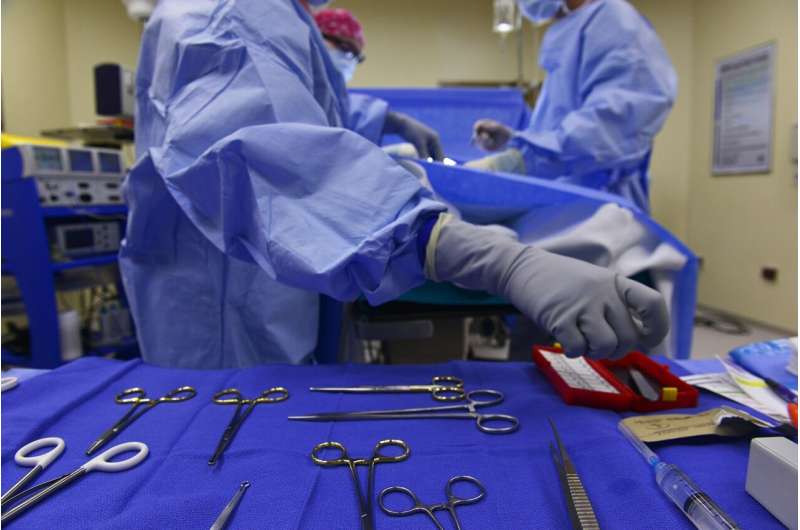This article has been reviewed according to Science X's editorial process and policies. Editors have highlighted the following attributes while ensuring the content's credibility:
fact-checked
peer-reviewed publication
trusted source
proofread
Study finds blood-brain barrier is more permeable in patients with delirium after surgery

Up to 40% of older surgery patients develop postoperative delirium, a syndrome of confusion that typically occurs in the first few days after surgery. Postoperative delirium is associated with longer hospitalizations, significant distress, and major postoperative complications, but its underlying causes have been elusive.
Previous studies in mice revealed that postoperative delirium may be due to disruptions of the blood-brain barrier, a layer of cells in the brain's blood vessels that prevent substances from entering the brain. Large human studies in this area had not been possible due to technical challenges in assessing the barrier.
A new Duke Health study has overcome these challenges and is one of the first large studies to demonstrate that patients who develop postoperative delirium have increased openings in the blood-brain barrier.
The study, published in Annals of Neurology, also found that patients who had lower performance on cognitive tests prior to surgery were more likely to experience postoperative delirium.
"These findings are significant because we now have a roadmap to tackle a problem that impacts millions of older adults in the U.S. every year," said Michael Devinney, M.D., Ph.D., corresponding author of the study, and assistant professor in the Department of Anesthesiology at Duke University School of Medicine.
"If we can find a way to prevent the blood-brain barrier from opening after surgery or figure out what is passing through this barrier and getting to the brain, we can work to develop a therapy that may prevent postoperative delirium," Devinney said.
To arrive at these findings, scientists examined more than 200 patients, ages 60 or older, before and after non-cardiac and non-neurological surgeries. To understand changes in the blood-brain barrier's permeability, they collected spinal fluid and blood samples before surgery and 24 hours after, measuring the ratio of a protein called albumin as an indicator of the barrier's fluidity.
The research team also wanted to control for cognitive ability as a risk factor for delirium. To do so, they administered extensive cognitive evaluations before and after surgery.
They found increased blood-brain barrier permeability is associated with greater delirium rates and longer hospital stays among all patients, suggesting that the permeability increase is a response to surgery. They also found that those with lower cognitive abilities experienced increased delirium rates. However, the lower performance on cognitive testing affected delirium risk separate from postoperative blood-brain barrier opening.
"Our work suggests that there may be a two-hit model for postoperative delirium," Devinney said. "It appears to involve both a predisposing factor such as impaired preoperative cognition, and a precipitating factor involving postoperative blood-brain barrier dysfunction."
It is known that inflammatory molecules can pass through a leaky blood-brain barrier and cause cognitive impairments. Devinney said researchers are already planning a follow-up study to take a closer look at the collected spinal fluid samples to see if particular inflammatory factors are present in higher concentrations among patients who experienced delirium.
More information: Michael J. Devinney et al, Role of Blood–Brain Barrier Dysfunction in Delirium following Non‐cardiac Surgery in Older Adults, Annals of Neurology (2023). DOI: 10.1002/ana.26771



















